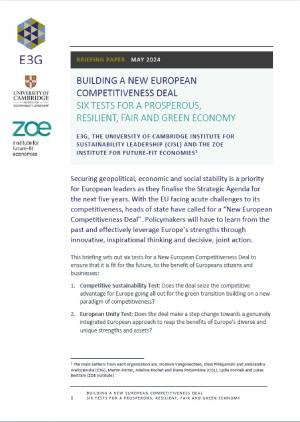22 May 2024 - Securing geopolitical, economic and social stability is a priority for European leaders as they finalise the Strategic Agenda for the next five years. With the EU facing acute challenges to its competitiveness, heads of state have called for a “New European Competitiveness Deal”. Policymakers will have to learn from the past and effectively leverage Europe’s strengths through innovative, inspirational thinking and decisive, joint action.
Download the business briefing.
With elections and the subsequent start of a new political cycle looming, one topic has dominated EU politics: competitiveness. Former Italian Prime Minister Enrico Letta recently published his report on the future of the single market, setting out recommendations for tackling competitiveness. Brussels is now waiting for Mario Draghi’s forthcoming report on the future of European competitiveness.
The EU is facing new and deeper challenges to its competitiveness and economic model, including the changing nature of global competition, geopolitical tensions and vulnerable supply chains. There is a clear sense that tackling these will require a shift from incremental change towards more radical responses.
A prosperous and competitive Europe is expected to be one of the three pillars of the EU’s Strategic Agenda. This will make competitiveness a prominent part of a policy framework that links to other areas, including climate action, energy security and social cohesion. The content and framing of a New European Competitiveness Deal will therefore deeply impact the parameters and pace for addressing a wide range of political objectives.
Six tests for the New European Competitiveness Deal
There is a narrowing window of opportunity ahead of the June European Council to shape the contours of the Strategic Agenda and set out what a good deal could look like. In this context, E3G, the ZOE Institute, and CISL have drawn on their respective areas of expertise to develop six tests for a New European Competitiveness Deal to ensure that it is fit for the future, to the benefit of Europeans citizens and businesses.
- Competitive Sustainability Test: Does the deal seize the competitive advantage for Europe, going all out for the green transition building on a new paradigm of competitiveness?
- European Unity Test: Does the deal make a step change towards a genuinely integrated European approach to reap the benefits of Europe’s diverse and unique strengths and assets?
- Investment Scaling Test: Is the deal backed by a substantial rise in common EU resource and action to leverage private capital, setting the conditions for their effective usage?
- Smart Regulation Test: Does the deal leverage the innovation potential of the internal market through smart and impactful regulation?
- Social Cohesion Test: Does the deal make the delivery of broader societal benefits a central priority, through a fully inclusive process?
- Foreign Policy Test: Is the deal internationally resilient and grounded in fair global rules?
Citing this report:
University of Cambridge Institute for Sustainability Leadership (CISL); E3G; ZOE Institute for Future-fit Economies. (2024). Building a New European Competitiveness Deal: Six Tests For A Prosperous, Resilient, Fair And Green Economy. Cambridge, UK: CLG Europe.





